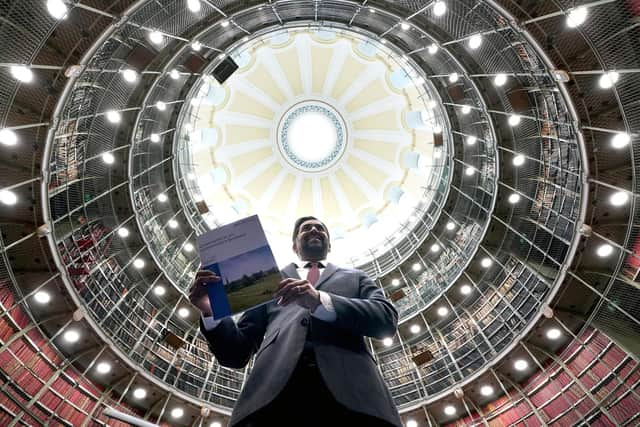SNP might look defeated, but nationalism has still to be routed - Brian Monteith
Will the Labour Party win the Rutherglen and West Hamilton by-election? If it does not it will be highly damaging for Anas Sarwar and Keir Starmer’s reputations. All the signs I am seeing suggest it is the Labour Party’s to lose.
Likewise, with a consistent lead of twenty per cent in the polls over the Conservatives and easily winning the Selby by-election, Labour looks certain to stroll into 10 Downing Street. Yes, Labour failed in the Uxbridge & South Ruislip by-election, but all the evidence points to the local campaign against the Mayor of London’s ULEZ charges being expanded into that area as being a very strong local factor. As there is no issue generating similar passions – driving voters to reconsider the Conservatives as preferable to Labour – the balance of probabilities favours Starmer winning a landslide across the country.
Advertisement
Hide AdAdvertisement
Hide AdThe Conservatives face the prospect of losing to Labour in seats previously won by Tony Blair back in the noughties, plus losing to Liberal Democrats in seats where they came second last time – then seeing a couple of dozen Labour MPs defeating the SNP to boost the numbers further. This would all add up to a handsome majority for Starmer, possibly even a landslide.


A decent majority would give Starmer at least four years, with a general election not required until 2028 – and a landslide could mean Labour being in power for at least two terms – until as late as 2034. This raises a question of where does such a likely Labour general election victory, or victories, leave the cause of Scottish independence?
I was prompted to think about this due to a new paper by Professor Lindsay Paterson where he concludes it is reasonable to expect that due to sociological trends support for Scottish independence among the Scottish electorate – despite any short term setback the SNP may face in the next General Election.
The professor believes that if an underlying trend growth of nationalism since 1979 continues it will take consistent support for independence to sixty per cent by the 2030s – the figure at which it is thought a referendum would be impossible for Westminster to deny. Paterson also postulates the possibility of the SNP winning the next Holyrood election on the basis that by the time it is due to be held in 2026 we will be into the mid-term of a Starmer administration and the SNP will be well placed to benefit from some voters concluding Labour has not been the answer they hoped for .
I have a great deal of respect for Professor Paterson’s work in education, where the statistical evidence he has presented around poor attainment levels has often led him to be a critic of some policies being pursued by SNP education ministers. His latest paper, looking at possible political outcomes over the next decade, should likewise be welcomed, for although I do not this time share his conclusions it is a necessary wake-up call to the complacent among us who think a disgraced SNP will simply shrivel-up and become irrelevant, taking the cause of nationalism with them. That simply is not going to happen.


Those who believe in and support the unity of Britain, or more accurately the United Kingdom, cannot afford to take nationalism as a fad that will wither away. Instead we need to promote the positives of our country – that incidentally attract a net figure of nearly a million people a year to come here – while recognising championing that those aspects that need to be improved upon can be changed democratically.
It is this evolutionary change and what political parties might do when they gain power that I believe Lindsay Paterson cannot easily factor into his statistical analysis, and for me offers up many different scenarios.
For instance, it is far too early to conclude the fall in support for the SNP has run its course. A week does not pass when a Scottish Government policy decision is seen to have resulted in expensive catastrophe. The latest is how India is reputed to have put a spacecraft on the moon for less than SNP ministers spent on constructing two ferries that have yet to go to sea. Roads that Scottish voters were expecting the SNP/greens to upgrade to two-lanes remain untouched, local authorities suffer wave after wave of cuts, and scandals around excessive spending on Scottish Government staff numbers and expenses are never ending. Humza Yousaf’s popularity may continue to tank and the SNP infighting may continue to rip the party apart.
Advertisement
Hide AdAdvertisement
Hide AdThen there’s what might yet happen with the police investigation into the party’s finances.
Additionally, we cannot discount that Labour actually might do better than the Conservatives and be more popular, making the prospect of a Labour victory in the 2026 Holyrood elections possible.
Nor can we know what a defeat by Labour will do the Conservatives and if that might mean a leadership change that sees that party’s fortunes recover – including in Scotland.
There are too many variables to see what the likely political outcomes will be, but one thing is certain, nature abhors a vacuum. If the arguments are not put as to why nationalism is a corrosive force that would lead to the ruin of Scotland outside the United Kingdom then it will be brought forward again by another party, if not ta rebranded and relaunched SNP.
The lesson Professor Paterson’s paper helpfully reminds us is it is nationalism that has to be defeated not just the SNP.
Comments
Want to join the conversation? Please or to comment on this article.